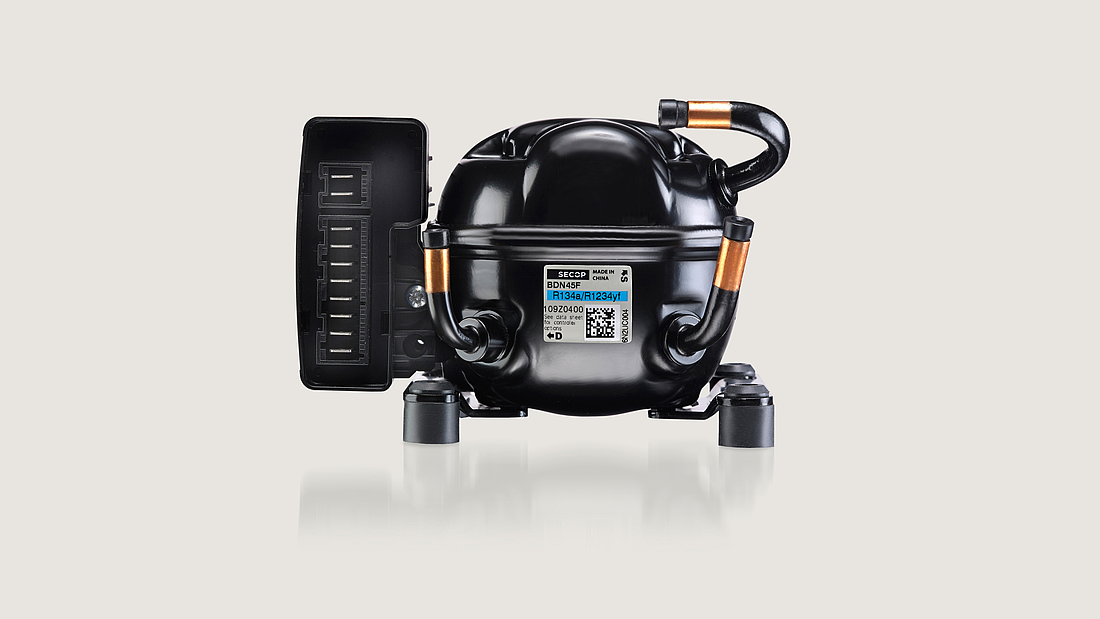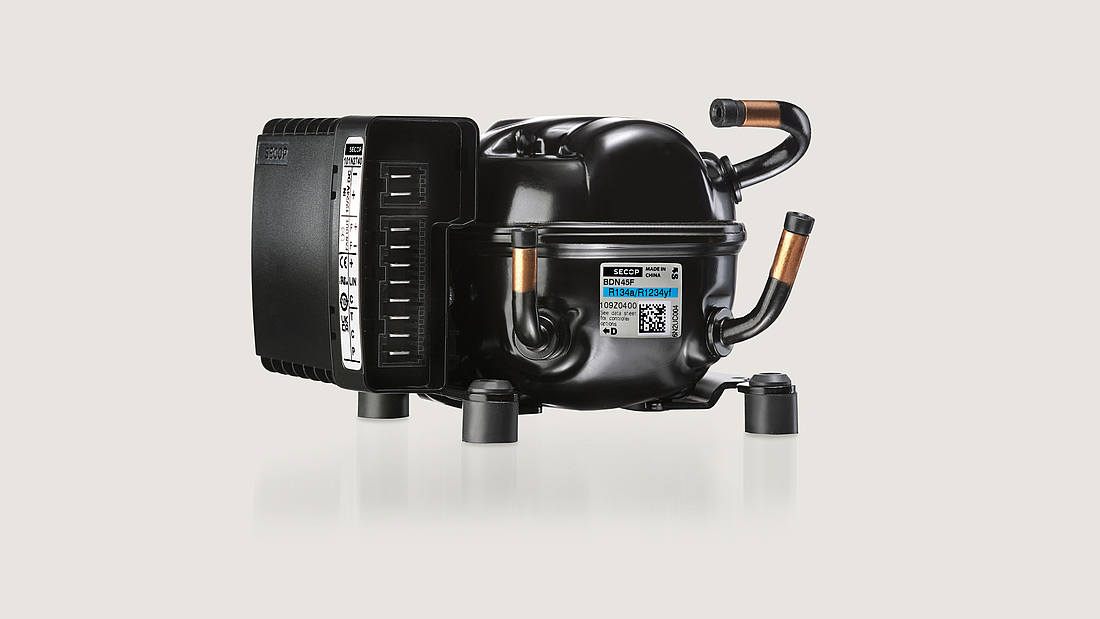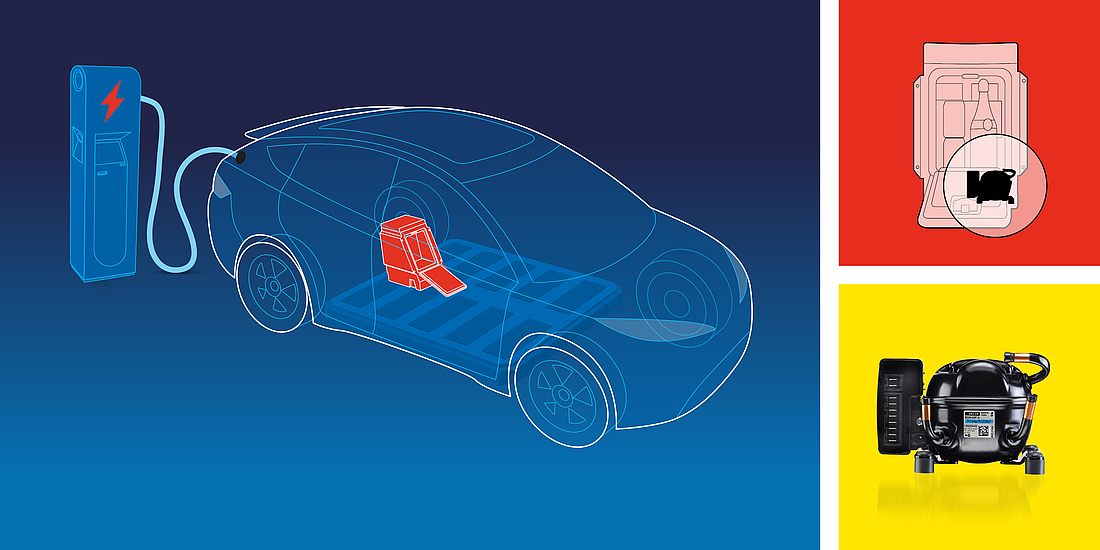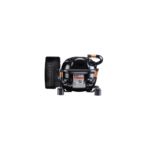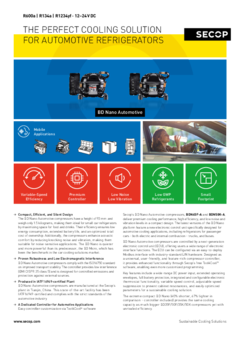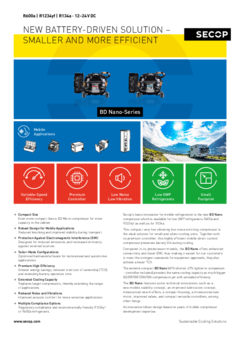The Perfect Compressor for Automotive Refrigerators
The BD Nano compressor is a disruptive, innovative product thanks to its premium performance and small size with reduced noise. It was designed in Europe and produced at the Secop plant in China. The Tianjin plant has been certified IATF16949 since December 2023 and is compliant with automotive standards, unique in the refrigeration industry.
The BD Nano is light, compact, and, in parallel, efficient and powerful, and proportionally small.
The Advantages of Mounting a BD Nano Compressor
Let's resume here the most important advantages from the users point of view:
- The fridges can have a bigger compartment to store drinks or food, thanks to the compact design;
- The refrigerator can cool food and beverages quickly, thanks to its outstanding cooling capacity;
- Low energy consumption or battery consumption in the case of electric vehicles, thanks to the high efficiency;
- Low maintenance cost, or a low TCO (total cost of ownership), because of the proven reliability and durability;
- Silent, thanks to the innovative design;
Compact, Efficient, Powerful
The BD Nano compressor is ideal for installation within limited space. It keeps battery consumption low and has a fast cool-down process.
The specs of the BD Nano compressor are an advantage for fridge OEMs. It allows a more extensive compartment for food and drinks, which will be appreciated more by the end-users. It is 93mm high [3.66 inches] and weighs 1.5 kilograms [3.3 lbs], with an efficiency of up to 1,53 W/W (ASHRAE LBP conditions).
This results in high energy efficiency, reduced TCO (total cost of ownership), and extended battery operation time. A big benefit where the battery consumption becomes crucial. The higher the efficiency, the lower the battery consumption, the longer the trip. Another key element for the drivers or the trave companions.
With a cooling capacity of 58.7W (ASHRAE LBP conditions), it represents a robust solution in a compact pack. In practical terms, it means the BD Nano has the power to cool down food or drinks faster, reaching the target temperature in a shorter time than any other solution on the market.
Robust and Silent
The BD Nano is designed for longevity and reliability without annoying noise. Its robustness, noiselessness, and low EMI (electromagnetic interference) make it the perfect compressor for automotive cooling solutions.
The BD Nano compressor's robustness is demonstrated by its ISO16750 compliance, which reduces knocking noise and vibrations and improves transport stability. This versatility allows it to be used in a range of transportation applications, from cars to trucks, buses, Recreational Vehicles, and boats.
It is more silent (-6 dB/A) thanks to improved acoustic comfort for noise-sensitive applications compared to Secop BD Micro, the current automotive market benchmark and BD Nano predecessor. BD Micro is mounted on the top luxury car models today. The BD Nano, a compact solution with premium performance, represents the perfect evolution to provide end users with a reliable and automotive-compliant fridge in the car.
A Complete Solution with the Electronic Controller
The automotive's new generation ECU (electronic controller unit) completes the cooling solution kit: it can be configured and controlled via an easy-to-implement Modbus interface using industry-standard LIN hardware. The ECU is designed to be a universal, easy-to-use, and feature-rich compressor controller. Its main features are a wide range of DC voltage supply inputs, an operating temperature envelope, configurable battery protection, fully integrated and configurable electronic thermostat functionality, variable compressor speed control, configurable speed blanking to prevent cabinet resonances, easy-to-optimize parameters to ensure sustainable cooling source.
The BD Nano can support the interior design of new-generation cars, saving space and battery energy consumption while offering a reliable cooling experience to the end user with a wide range of electronic interface features.
